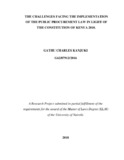| dc.description.abstract | This study demonstrates that up and until the year 2001, Kenya did not have a solid public procurement legal order, and the procurement regime was characterized by a liberal atmosphere which tolerated the culture of impunity and corruption. When the clamor for procurement laws heightened, procurement laws came into being namely the Exchequer & Audit Regulations of 2001, PPAD Act of 2005, the 2006 & 2011 Regulations and the 2015 PPAD Act with the latter finally being anchored in the Constitution of Kenya 2010.
However despite these milestones, challenges facing the former procurement regime continue to persist. These challenges include uncertainty and unconstitutionality of certain provisions in the Act, incongruent provisions between the 2006 Regulations and the Act, weakness and lack of independently resourced institutions, lack of good political will, corruption and impunity.
The continuing presence of these challenges is what has resulted in loopholes that the relevant actors in the procurement process have sought to exploit leading to non-adherence to procurement laws, policies and procedures and ultimately, the proliferation of procurement scandals in the country.
This study as such critically examined the Public Procurement law in light of the Constitution of Kenya 2010. It demonstrated that although Kenya has enacted elaborate legislative, institutional and administrative frameworks on public procurement, procurement scandals continue to persist. This is because despite the fact that the Constitution of Kenya 2010 sought to reform the public finance and governance structures in the country, nevertheless the sector continues to face numerous challenges.
In justifying these claims, the study relied on both doctrinal and non-doctrinal research methodologies that examined the historical evolution of the procurement system in Kenya, conducted a critical analysis of the procurement law in light of the CoK 2010, conducted a case review of select judgments, conducted a comparative analysis between Kenya and Hong Kong and conducted informal interviews on select state procurement officials.
The overall objective of this study therefore was to examine the challenges facing the implementation of the public procurement law in Kenya in light of the Constitution of Kenya 2010 and to provide appropriate proposals for reform.
The study concluded that there is need to align the Act with the Constitution; fill the loopholes previously misused and in the end create true institutions of accountability and transparency. It also argues that Kenya can learn several lessons from Hong Kong’s efficient, transparent and accountable public procurement system. | en_US |



